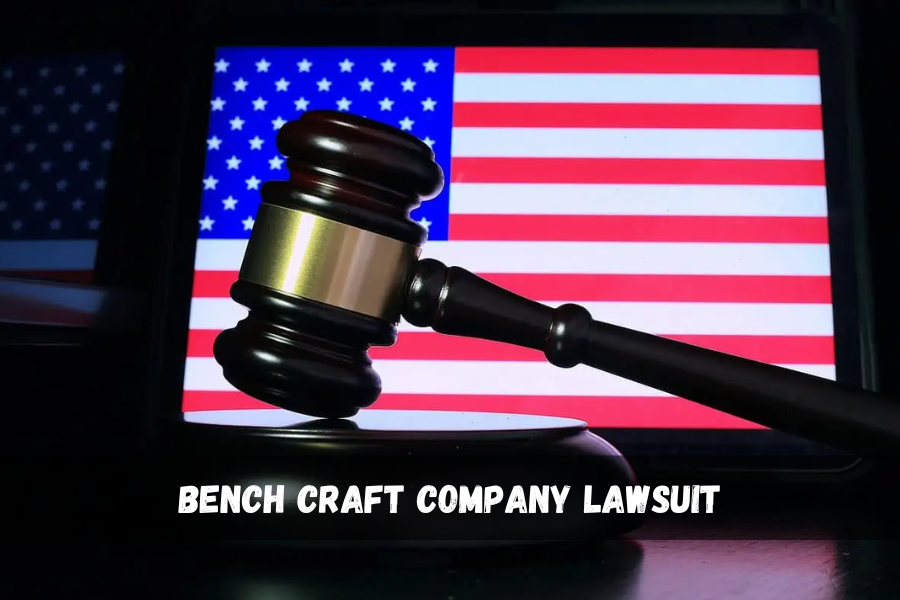Introduction
In recent years, Bench Craft Company has been at the center of multiple legal disputes that have garnered significant attention. As a well-known marketing and advertising firm specializing in outdoor and golf course advertising, Bench Craft’s reputation has been called into question amid a series of lawsuits involving allegations of deceptive practices, contractual violations, and the failure to meet expectations set with clients. These legal issues have not only raised questions about the company’s operational ethics but also shed light on the broader challenges facing the advertising industry. Let’s explore the ongoing Bench Craft Company lawsuit and what it means for both the company and the marketing world.
Background of Bench Craft Company
Bench Craft Company is a marketing firm that focuses on outdoor advertising, particularly in the golf industry. The company has garnered attention through its unique approach to advertising on golf course benches and tee boxes. While the company initially gained recognition for its innovative methods, recent lawsuits have placed its business practices under scrutiny. Allegations against the company revolve around misleading marketing tactics, failure to deliver promised services, and deceptive business dealings with small businesses and local advertisers.
The Lawsuit: Allegations and Claims
The lawsuits filed against Bench Craft Company have come from a variety of plaintiffs, mostly consisting of small businesses that entered into advertising contracts with the company, expecting significant returns on their investments. The key allegations include:
False Advertising: Several plaintiffs have claimed that Bench Craft exaggerated the effectiveness of their advertising services. These businesses were told that they would see substantial increases in customer traffic and brand visibility, but the promised results never materialized.
Breach of Contract: Bench Craft has been accused of failing to uphold contractual agreements. Clients alleged that the company did not deliver the advertising placements as agreed upon or provided inferior services compared to what was initially promised.
Failure to Provide Services: In some cases, businesses were charged for advertising services that were either not delivered at all or not completed as per the contract. Clients have argued that Bench Craft often left their ads in ineffective or non-visible locations, diminishing the value of the service they paid for.
Unclear Terms and Misleading Language: A central issue in many of the lawsuits is the allegedly deceptive language used in Bench Craft’s contracts. Some plaintiffs have claimed that the terms were vague, leaving businesses with little recourse when the advertised benefits didn’t materialize.
These lawsuits have raised broader concerns about the ethics of marketing practices, particularly when it comes to small businesses and local advertisers who rely on these services to boost visibility and grow their customer base.
You May Also Like To Read: Prodigy Promos Lawsuit: A Wake-Up Call for Ethical Practices in Marketing
Bench Craft Company’s Defense
In response to these serious allegations, Bench Craft Company has staunchly defended its practices. The company argues that the results from their marketing services are contingent upon numerous external factors, including location, the specific business niche, and market conditions, which makes it impossible to guarantee success. According to Bench Craft, they fulfilled their contractual obligations, but the businesses suing them failed to take advantage of the opportunities offered.
Furthermore, the company contends that the terms outlined in their contracts were clear and transparent, with no intention to deceive clients. They argue that their advertising method works for a certain subset of businesses, but it may not be effective for others.
Impact on Local Businesses
The lawsuits have created significant ripple effects in the business community, particularly among small and local businesses. Many of these businesses have been left questioning the reliability of advertising agencies and whether their investments in marketing were truly worthwhile. The situation has cast a shadow over bench advertising, a niche market where Bench Craft Company holds significant influence. Many small businesses, already struggling in the post-pandemic economy, are now more cautious about where they allocate their marketing budgets.
The backlash against Bench Craft has led to a broader conversation within the marketing industry about the responsibility of advertising agencies to be transparent and honest with clients. Small business owners are now learning the importance of thoroughly reviewing contracts, ensuring clear terms, and seeking professional legal advice before entering into marketing agreements.
You May Also Like To Read: Inside the 72 Sold Lawsuit: Claims, Settlements, and Industry Repercussions
The Legal Proceedings and Timeline
The legal proceedings surrounding the Bench Craft Company lawsuits have been drawn out over several years. After the initial filings, there were numerous court hearings, motions filed, and testimonies presented by both plaintiffs and defendants. As is often the case in high-profile lawsuits, each side has worked to craft a narrative that supports their stance.
The timeline of these proceedings includes several key milestones, from the original complaint to ongoing negotiations that may lead to a potential settlement. However, as of now, the lawsuits have not reached a resolution, and the outcomes remain uncertain. Legal experts have speculated that these cases could result in significant financial settlements, but the specifics are still up in the air.
Broader Implications for the Advertising Industry
The Bench Craft Company lawsuits have sparked a larger debate about the ethics of advertising in niche sectors like golf course marketing. While outdoor advertising can be an effective strategy, these lawsuits highlight the need for greater transparency, measurable results, and clear communication between advertising firms and their clients. Small businesses, which often operate on tight margins, are now more wary of entering into long-term advertising agreements without ensuring that the terms and conditions align with their goals.
These legal challenges could also lead to regulatory changes within the marketing industry, with calls for stricter oversight of advertising firms and the practices they employ. Legal experts predict that if the lawsuits result in a substantial verdict, it could set a precedent for how advertising contracts are negotiated and enforced in the future.
Media Coverage and Public Reaction
The lawsuits against Bench Craft Company have received extensive media coverage, particularly within the marketing industry and local business communities. News outlets and legal blogs have covered the progress of the lawsuits, with many articles focusing on the potential impact on the company’s reputation and future prospects. The public’s perception of the company has shifted, with some customers expressing doubts about the legitimacy of their services and others warning small businesses to be cautious when considering Bench Craft as an advertising partner.
Public reaction has ranged from frustration and anger among the plaintiffs to calls for accountability and transparency in advertising. The legal battle has been seen by some as a cautionary tale for businesses that may have fallen victim to deceptive marketing tactics, urging them to thoroughly vet advertising firms before signing any agreements.
Looking Forward: Lessons Learned
The Bench Craft Company lawsuit saga offers valuable lessons for small businesses, advertising firms, and the wider marketing industry. One of the key takeaways is the importance of conducting due diligence when entering into any contractual agreement. Small businesses, in particular, need to ensure that they fully understand the terms and conditions of advertising contracts and be prepared to take action if services are not delivered as promised.
Additionally, the case highlights the need for greater accountability in the marketing industry. Advertising agencies must be transparent about the results they can deliver and avoid making unrealistic promises that could lead to legal disputes. If anything, the Bench Craft Company lawsuits have shown that the cost of deceptive marketing practices is high—not just in terms of financial damages, but also in reputation and trust.
The lawsuits are far from over, and their final outcome could have a lasting impact on the future of outdoor and niche marketing. Only time will tell how the courts will rule and whether Bench Craft Company will be forced to pay for its alleged misdeeds or whether a settlement will resolve the matter. However, the ripple effect of these legal challenges will likely continue to shape the marketing industry for years to come.
These events have also provided a wake-up call for other companies in the advertising space, emphasizing the need for ethical practices and a transparent approach when dealing with clients. If the marketing world can learn from the mistakes made in this case, future businesses might avoid the pitfalls that have plagued Bench Craft Company.
For now, as the legal drama continues, businesses and marketers alike will be watching closely, learning from this unfolding saga to avoid similar pitfalls in their own operations.
You May Also Like To Read: The Significance of RSS Letter No 0876 in Shaping Modern India
Conclusion
The ongoing Bench Craft Company lawsuit underscores the importance of transparency and ethical practices in the advertising industry. As small businesses continue to face the fallout from these legal disputes, the case serves as a stark reminder of the potential consequences of deceptive marketing practices. While Bench Craft defends its methods, the allegations against it highlight the challenges of ensuring clear communication, measurable results, and a solid commitment to fulfilling promises in advertising contracts. As the lawsuits progress, the advertising industry as a whole may face a reckoning, with heightened scrutiny and regulatory changes expected. For small businesses, the case emphasizes the need for careful contract review and understanding the true value of any marketing investment. In the end, these legal battles could reshape the landscape of outdoor advertising, setting new precedents for accountability and fairness.
FAQs
What is the Bench Craft Company lawsuit about?
The Bench Craft Company lawsuit involves allegations of false advertising, breach of contract, and failure to provide the services promised to clients, particularly small businesses in the golf industry. These businesses claim they were misled about the effectiveness of the advertising services offered by the company.
Who are the plaintiffs in the lawsuit?
The plaintiffs primarily consist of small businesses and local advertisers who entered into contracts with Bench Craft Company for outdoor advertising services on golf course benches and tee boxes.
What are the key allegations against Bench Craft Company?
The key allegations include false advertising, breach of contract, failure to deliver promised services, and unclear or misleading language in the contracts, which plaintiffs argue left them without recourse when the promised results didn’t materialize.
How is Bench Craft Company defending itself?
Bench Craft argues that the results of their marketing services depend on factors outside their control, such as location and market conditions. They claim they fulfilled their contractual obligations, but the businesses suing them failed to capitalize on the opportunities provided.
What impact has this lawsuit had on small businesses?
The lawsuit has raised concerns among small businesses about the reliability of advertising firms and whether their marketing investments were worthwhile. It has also prompted businesses to be more cautious and thorough in reviewing advertising contracts.
What could the legal outcome mean for the advertising industry?
The case could lead to stricter regulations and oversight in the advertising industry, particularly regarding transparency and the promises made in marketing contracts. It may also set new precedents for how such disputes are handled in the future.
What lessons can be learned from the Bench Craft Company lawsuit?
The lawsuit highlights the importance of due diligence when entering into advertising agreements, especially for small businesses. It also underscores the need for advertising firms to be transparent and realistic about the results they can deliver to avoid legal disputes.
Is the Bench Craft Company lawsuit over?
No, the lawsuits are ongoing, and the outcome remains uncertain. There have been numerous hearings and motions, but as of now, the legal proceedings are still in progress.
Discover the latest news and updates on LET MAGAZINE Best Regards!



